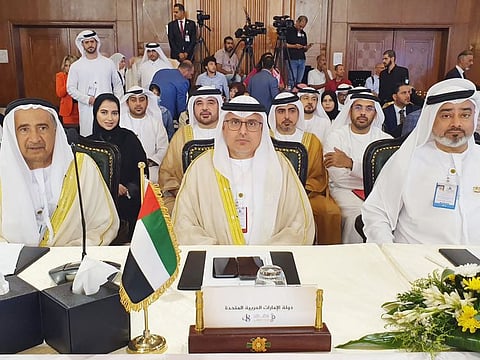How UAE’s early adoption of disruptive tech ensured future job readiness
Human Resources minister leads UAE delegation to 48th Arab Labour Conference in Cairo

Dubai: The UAE has reaffirmed that developing new strategies to upskill workers and enhancing business environments for employers are necessary to prepare for the digital future of work.
This came during a speech by Dr Abdulrahman Al Awar, Minister of Human Resources and Emiratisation and head of the UAE delegation, at the 48th Arab Labour Conference that opened on September 18 and will run until September 25 in Cairo, Egypt.
Dr Al Awar said that young people are the fastest group to not only adopt new technologies but also to keep pace with disruptive innovations that create new business models.
He added: “Developing integrated strategies that ensure the availability of qualified workers can contribute to building diverse, flexible, competitive and knowledge-driven economies.
“The UAE is preparing for the next 50 years by building human capabilities in new fields that align with the vision of President His Highness Sheikh Mohamed bin Zayed Al Nahyan. By accelerating priority sectors and adopting advanced technologies, such as artificial intelligence, the Emirates aims to become the most competitive and attractive economy in the world.”
Government priority
Digital transformation has been a government priority in the UAE for decades. Al Awar said: “In 2000, His Highness Sheikh Mohammed bin Rashid Al Maktoum, Vice President and Prime Minister the UAE and Ruler of Dubai, announced the e-government programme, which formed the cornerstone of the nation’s digital transformation.”
He added: “The UAE government has approved the UAE Digital Economy Strategy, which aims to raise the contribution of this sector to 20 percent of the total non-oil national economy in the coming years. Our nation has also established The UAE Digital Economy Council, which seeks to support the country’s efforts to double the digital economy’s contribution to the GDP in 2031.”
Future jobs
The new labour legislations in the UAE boost strategic and qualitative change to the labour market and business environment, Al Awar said, explaining that investing in future jobs and industries must be developed with an integrated legislative and legal structure and an advanced digital infrastructure.
“This was one of the strategic plans adopted by the UAE during the COVID-19 pandemic. It has proven successful and effective in supporting business continuity and maintaining the strength of the national economy, which recovered from the pandemic and made the UAE one of the world’s fastest-recovering nations,” he said.
“As the Arab world looks to new economic horizons, updating laws and regulations based on the latest global studies to keep pace with rapid transformations in local and international markets has never been more necessary,” Dr Al Awar concluded.
Platform for Arab leaders
Hassan Mohamed Hassan Shehata, Minister of Manpower in Egypt; and Ambassador Abdul Hussein Al Hindawi, Assistant Secretary-General of the League of Arab States, attended the opening session.
The conference serves as a platform for Arab leaders to discuss the Director-General of the Arab Labour Organisation’s report, titled ‘The Digital Economy and Employment Issues’. They also discussed digital technologies that contribute to the 2030 Sustainable Development Goals, artificial intelligence, and the fast-changing world of work.
Sign up for the Daily Briefing
Get the latest news and updates straight to your inbox

